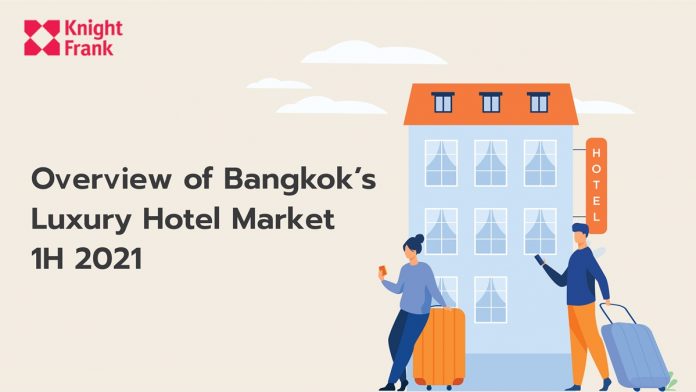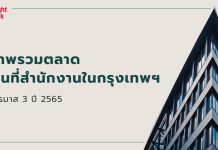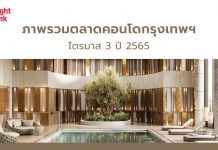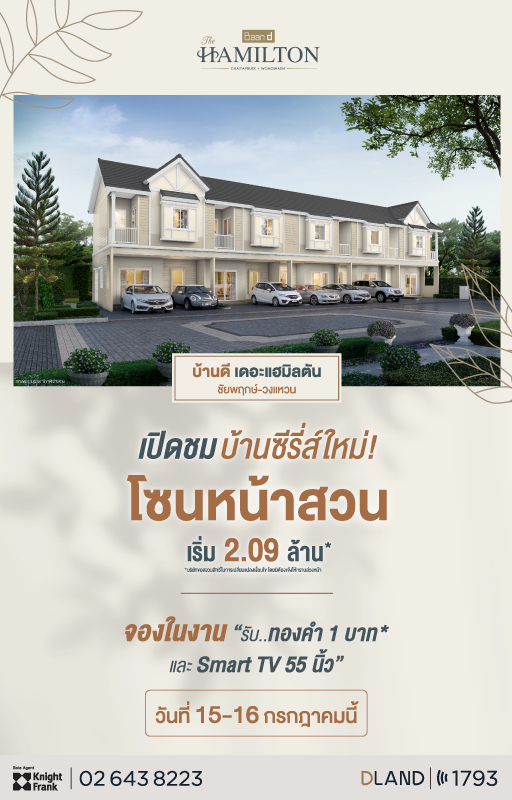
Mr. Carlos Martinez, Director of Valuation and Advisory, Knight Frank Thailand said, Hotel occupancy rates fell significantly at the beginning of 2021 due to the measures enforced by the Thai government after the second outbreak in Samut Prakan province that rapidly spread over Bangkok. The increase of Covid-19 cases resulted in a drop in demand for accommodation. Despite the relative success of Thailand’s approach to containing the spread of the Covid-19 pandemic, the Covid- 19 vaccine rollout has been slow. It started in late February 2021, and as of May 2021, the vaccination rate was at only 3.6% with at least one dose of vaccine.
The number of international tourists remained low. Thailand received approximately 140,000 international tourists in 1H 2021, a sharp decrease of 98% YoY from 7.1 million in 1H 2020, as the international travel restrictions remained in place.

In 1H 2021, 44% of the total number of international visitors were from Europe, followed by East Asia (28%) and the USA (13%), replacing China as the largest market feeder as the Chinese outbound travel ban continues.
Supply and Demand
Early Sukhumvit area comprises the majority of the luxury hotel supply with 39% of the total supply followed by Lumpini (24%), Riverside (17%), and Silom/Sathorn (14%).

The average occupancy rate of luxury hotels in Bangkok dropped further to 20% in the first half of 2021. After the second wave of the Covid-19 outbreak at the beginning of the year, the tourism sector started a slow recovery with occupancy rates from 18% in January to 27% in March. The more severe third wave in April resulted in occupancy rates plummeting to 16% and 17% in May and June, respectively.
In 1H 2021, the Average Daily Rate (ADR) of luxury hotels fell by 36% YoY to THB 3,072 as those remaining hotels open, competed with discounts and promotions to attract a weak domestic market.

No new luxury hotels opened in Bangkok in the first half of 2021. As uncertainty continues on the border reopening date, and the pace of recovery in the number of international arrivals, hotels with plans to open in 2021 such as Ascott Embassy Sathorn Bangkok (361 rooms), Ascott Thonglor Bangkok (445 rooms), and The Standard hotel at Mahanakhon (154 rooms) will see delays.
Yet, hotel openings totaling 270 rooms in the upscale and midscale segment were Maitria Hotel Rama 9 Bangkok (110 rooms), and The Quarter Silom (160 rooms).
There were 20,555 luxury hotel rooms in Bangkok at the end of 1H 2021, unchanged since 2020.
Outlook
He concluded that the tourist sector in Bangkok highly relies on international visitors. The number of international arrivals continued at a record low because of the strict entry quarantine regulations implemented since the Covid-19 outbreak in 2020, resulting in record-low occupancy rates in hotels.
Several hotels remained partially or fully closed, as the only hotel demand continues to be domestic leisure visitors, and the special non-Thai nationality travelers coming from abroad under the Alternative State Quarantine scheme. Until the border reopens, hotel operators will continue to rely on the limited local demand, staycations, and quarantined guests. Consequently, the occupancy level and ADR are expected to remain at low levels in 2021.
Before a wide reopening to foreign visitors, the Thai government targets inoculating 70% of its residents by the end of 2021. However, the average of just over 200,000 doses administrated each day is still far from the 400,000 shots needed to achieve the government’s vaccine rollout plan to reach circa 40% of the population vaccinated by mid-October.
Thailand’s worst wave of infections began in April, and reached its peak in June with new restrictions enforced for Bangkok and other nine provinces, taking effect from June 28 for at least 30 days. With no end in sight to the pandemic and the resume of international cross-border tourism activity, the pandemic will continue to be an obstacle to the performance of the Thai hotel industry in 2021 and beyond. Once the restrictions are eased and the mandatory quarantine removed, is expected a gradual recovery supported by the pent-up demand from international leisure travel, which makes up the vast majority of visitors. Bangkok’s appeal as a destination, ranking the most visited city in the world by MasterCard’s Global Destination Cities Index, since 2014, has proved high resilience and fast recovery in past crises. Besides, Bangkok is a transportation hub in the heart of Asia with straightforward connections to other significant powerhouses in the region. Even though not a primary market feeder, the number of business travelers still make up a substantial proportion of the total number of visitors every year, and it is expected to continue in the upcoming years Post-Covid.














